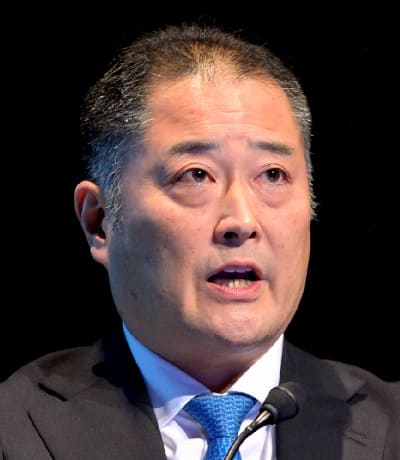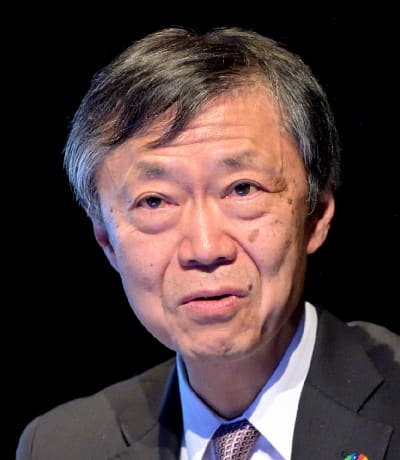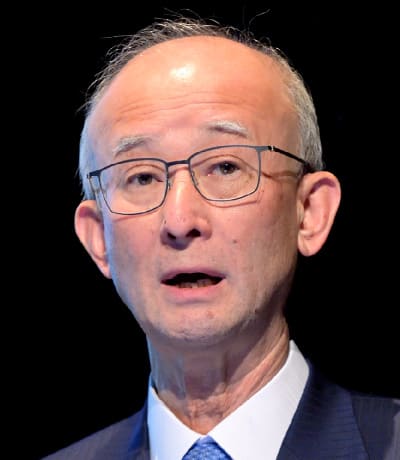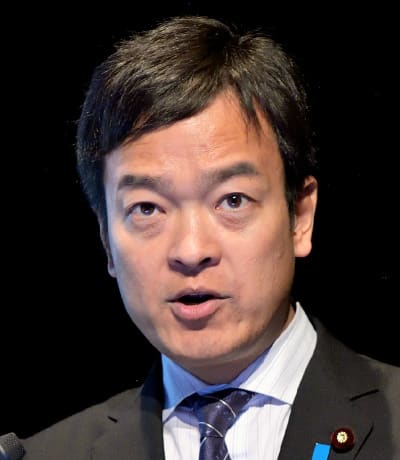Leveraging Startups, Collaborating with Startups
On hand for Session 4 were Naotaka Nishiyama, the founder and CEO of Tech Japan; Sadaharu Saiki, the Egypt-based founder and general partner of Sunny Side Venture Partners; Prantik Mazumdar, the president of TiE Singapore; and Kazuhiro Ohyama, the chief operating officer at Zoho Japan. Moderating the session was Akito Tanaka, the news editor at Nikkei Asia, Nikkei Inc.
Naotaka Nishiyama, Founder and CEO, Tech Japan
Sadaharu Saiki, Founder and General Partner, Sunny Side Venture Partners
Prantik Mazumdar, President, TiE Singapore
Kazuhiro Ohyama, Chief Operating Officer, Zoho Japan
A more-even playing field in the competition for Indian talent
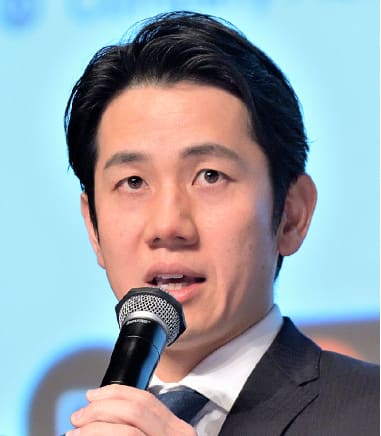
Naotaka Nishiyama
“We at Tech Japan,” explained Nishiyama, “strive to help shape a bright future for Japan and for Japanese companies by tapping Indian talent. We do that with our online Talendy platform for mediating recruitment of graduates of the Indian Institutes of Technology (IIT) and other leading universities. IIT has 23 campuses in India and is the nation’s premier educational institution for science and engineering.
“More than 1 million young Indians seek admission each year to institutions of higher education, and fewer than 1% of them gain admission to IIT. Prominent graduates includes such illuminati as Sundar Pichai, the CEO at Alphabet and its subsidiary Google, and Nikesh Arora, the former president and chief operating officer at Softbank Group. One in three students in their graduation year at the institute registered with Talendy.”
The competition among tech companies for IIT talent is intense, as described by Nishiyama. Leading tech companies from around the world come to the campuses to interview prospective employees, starting in December. IIT's rules provide that the interviewers need to inform the interviewees of their decisions immediately after the interviews and that the students need to accept or reject offers on the same day. In addition, the rules provide that students who accept offers cannot undergo any further interviews.
“Japanese companies are at a disadvantage,” Nishiyama warns, “to better-known Western companies in competing for talent. Overcoming language and culture barriers and reaching an important decision in just 30 minutes or an hour is a huge challenge. To level the playing field, we formed a working group in 2020 with METI, the Indian embassy in Japan, and several IIT campuses and other leading Indian universities. That led to the creation of our Talendy platform for letting students get acquainted with Japanese companies before the formal interviewing begins. Talendy has proved extremely effective, and 94% of the students who received job offers from Japanese companies last year accepted the offers.”
Startups that are addressing well-defined pain points

Sadaharu Saiki
Nurturing African entrepreneurship through venture capital investments culminates for Saiki a long-standing interest in the continent. Saiki first visited Africa as a backpacker when he was a university student. He spent nine years at the advertising firm Dentsu after finishing college, including three years in Bengaluru at Dentsu’s Indian subsidiary. Saiki then earned an MBA with Distinction from Harvard Business School and while there participated in several clubs, such as the Africa Business Club and the Impact Investing Club, and served venture capital internships in Nairobi and Washington, DC, as well as a consulting firm internship in Johannesburg. He went from Harvard to the Tokyo office of McKinsey & Company and then established Sunny Side Venture Partners in 2022.
“Sunny Side Venture Partners,” Saiki announces with pride, “was the first Asian venture capital firm to set up shop in North Africa. We have invested in or contracted to invest in 19 companies that operate in 17 nations. Our investment policy is sector agnostic, but we focus rigorously on startups that are addressing well-defined pain points.”
Saiki introduced some of Sunny Side’s investee companies, describing how they address different pain points in their markets. Most of the investees operate as business-to-business enterprises, though several serve consumer demand.
“The biggest issue for the startup ecosystem in Africa,” says Saiki, “is liquidity. Venture capital investors need to have viable avenues to exit their investments. A lot hinges on initial public offerings and M&A outside Africa, mostly in Europe and the United States, but recently I see increasing opportunities for funding from Saudi Arabia and the United Arab Emirates. Investors in those nations are looking for post-petroleum growth avenues. Tech startups are a natural target for their interest, and we are striving to respond with persuasive investment opportunities.”
Globally networked support for entrepreneurs

Prantik Mazumdar
Mazumdar serves as the president of the Singapore chapter of TiE, a global, nonprofit network devoted to supporting entrepreneurs. TiE originated in the Silicon Valley in 1992 as the brainchild of several entrepreneurs, corporate executives, and senior professionals who shared roots in the Indus region. It has grown to encompass about 15,000 members at 66 chapters in 14 nations. TiE’s support for entrepreneurs spans mentoring, networking, education, funding, and incubation.
“We work with large organizations,” explained Mazumdar, “as well as early-stage founders through various initiatives and programs. The modern tech startup ecosystem in India is about a decade along. The nation has about 150,000 startups as recognized by the government, of which 118 have reached the unicorn stage [market capitalization in excess of US$1 billion]. It is the third-largest startup ecosystem in the world, after the United States and China. Startup activity before the millennium was all about software and outsourcing. We are moving now to actual product development and value creation and intellectual property creation.
“As for Africa, it has some key pockets—Egypt, Nigeria, Kenya, and South Africa—where you see the bulk of the startup activity happening. But it is also happening in pockets in such places as Senegal, Morocco, Namibia, and Angola, where you are beginning to see startup ecosystems emerge. From an India-Africa perspective, the six biggest Indian investors in Africa are of course huge enterprises: Tata, Adani, Reliance, Mahindra. Adani, and Bharti. But Indian startups that have attained market capitalization of around US$500 million are getting into Africa through partnerships. They are principally in the fintech, agritech, and edtech sectors.”
A unique approach to human resources development
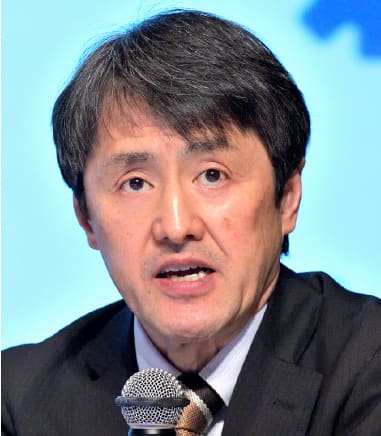
Kazuhiro Ohyama
“We are a technology company,” explained Ohyama, “that provides 55 cloud-service products to more than 120 million users in more than 150 nations. Our headquarters is in Chennai, and we employ more than 18,000 people around the world, with over 12,000 being in Chennai.”
Zoho has a broad product portfolio, which ranges from applications for sales and marketing, collaboration, and communication to human resources management and accounting, with its customer experience applications being a key offering in most regions. Zoho, established in 1996, has not listed its shares on any stock exchange and remains private and bootstrapped. That has been in the spirit, according to Ohyama, of insulating R&D policy and employees from external influence and pressure. Another overriding emphasis that he cites at Zoho is on ensuring the integrity of personal information. The company operates its own data centers, for example, rather than outsourcing the data-processing support for its services.
“More than 12,000 people work at our headquarters complex in Chennai,” continued Ohyama. “And we have offices in several other cities around the world. We regard Africa as a growth market and operate there out of offices in South Africa, Kenya, Egypt, and Nigeria.”
Ohyama also introduced the Zoho Schools of Learning program. In that program, Zoho provides two years of higher education to young people who have graduated from school as an alternative to university education. The program includes on-the-job training in software development, and graduates move on to employment at Zoho. The company charges no fees for the schooling and pays the students a monthly stipend, which starts at 10,000 rupees.






